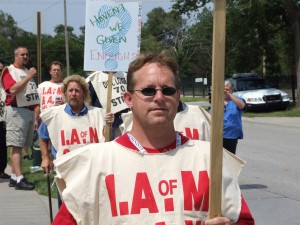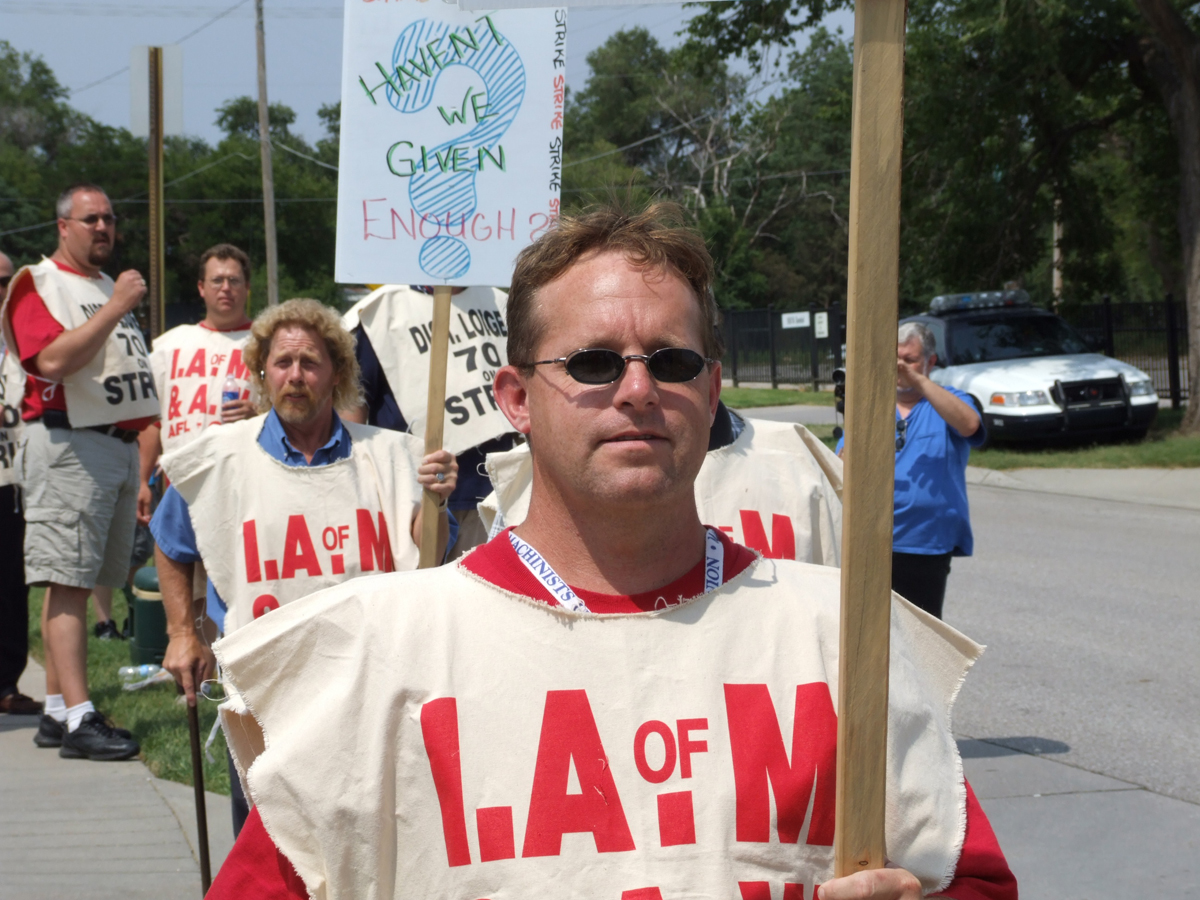
On Aug. 4, at 12:01 am, Hawker Beechcraft Corp.’s workers belonging to the International Association of Machinists and Aerospace Workers union went on strike.
By Karen Di Piazza
On Aug. 4, at 12:01 am, Hawker Beechcraft Corp.’s workers belonging to the International Association of Machinists and Aerospace Workers union went on strike. Union spokesperson Bob Wood said that 4,400 union workers at Hawker’s facility in Wichita, Kan., were on the picket line, with 452 additional workers striking the aircraft manufacturer’s Salina facility. He added that by the end of the first day of the strike, nearly 100 union members had crossed the picket line.
“The union has the right to impose financial penalties for those crossing the picket line,” Wood said.
The unions’ contract expired Aug. 4. Hawker said it had addressed every major issue brought to the bargaining table by union leadership. The plane maker’s proposed package contains “increased wages, more choices in healthcare plans, and improved medical, dental, vision and pension benefits.” The company said its final offer was the best offer made to employees in more than 20 years. The last strike occurred in 1994.
Has the strike affected Hawker’s operations? During the company’s second quarterly earnings conference call on Aug. 13, Jim Schuster, chairman and CEO of Hawker, along with Jim Sanders, CFO, said that more than 1,000 union workers “are at work.” Schuster said that salaried workers and some engineers were moved to its production lines during the strike.
Wood said that the union disputes this.
“It’s more like 300 workers, not 1,000 union workers who are at work. And more than 500 Hawker non-union members are honoring the picket line,” he said.
During Schuster’s conference call, he said the company is open for business operations.
Careful not to mislead people about the strike, he said telling people that the company is running at full strength would be misleading.
However, he said, “We have been very pleasantly surprised.”
During the call, the company revealed net sales for the second quarter of this year totaling $1.03 billion, up from last year’s $327.6 million. Operating income totaled $86.4 million for the second half of 2008, a loss of $36.6 million from the second quarter of 2007. However, the company booked $1.7 billion in aircraft orders for the first quarter, upping the company’s backlog to $4.7 billion. The union is keenly aware that this is a record-setting backlog for the company.
“With a record-setting backlog of orders, workers who build Hawker’s aircraft from nose to tail want a fair wage for doing so,” Wood said. “There’s more at stake here.”
Wood said that those on strike at Hawker are aware that Boeing, whose contract expires on Sept. 3, could be facing the same thing. He said that strike could affect 800 additional workers in Wichita, plus 40,000 workers in Seattle.
“On Aug. 18, the union is holding a rally in Wichita, because Boeing has already been talking about taking pay and benefits away,” he said.” We’re very capable of holding two strikes at the same time. Workers on the floor, who actually build and put together manufacturers’ aircraft, aren’t making six figures a year. We’re talking about people who’ve been subjected to the mortgage crisis and rising costs of fuel.”
How can workers afford to strike?
“Workers are committed to strike for the future, for fair wages and healthcare benefits,” Wood said. “Without these people who get their hands dirty, the workforce for companies is nonexistent. People who work for aircraft manufacturing plants, especially in Wichita, have it their blood. Workers of today come from second, third generations; they’re people who’ve spent their lives working for these manufacturers—from family to family.”
Front line issues for union members

Jim Schuster, chairman and CEO of Hawker Beechcraft Corp., said that salaried workers and some engineers were moved to its aircraft production lines during the strike.
On Aug. 2, Wood explained that two votes took place before the strike began.
“First we voted to accept or reject Hawker’s contract; 90 percent of the workers rejected it,” he said. “The other vote was whether or not to strike; 89 percent of workers voted to strike.”
When asked how many workers voted, Wood said the union isn’t releasing that information. In an earlier statement released by Hawker, it said its new contract for hourly wage assembly workers was at $23.42. Hawker compared the hourly wage against Cessna Aircraft Co.’s rate of $24.76. Hawker said that its new offer totals more than $100 million in new costs over the course of three years.
Wood said that Hawker’s comparison to Cessna’s wages is comparing apples and oranges.
“Cessna’s new contract, beginning Sept. 15, increases assembly workers’ hourly wages to $25.75,” he said. “We were already behind with Hawker’s old contract; we would’ve been further behind by accepting its newest offer.”
Assembly workers, explained Wood, represent more than 50 percent of those on strike. However, engineers and management personnel employed by Hawker aren’t striking the company.
“Assembly workers build and put the aircraft together from nose to tail,” he said. “The rest of union members on strike are made up of machinists, tool and die workers, production machine operators, etc.”
Because both sides can’t seem to reach a settlement, Wood said union members vow to strike as long as it takes.
“Workers want fair wages and a fair healthcare program,” he said. “Under Hawker’s contract, workers’ out-of-pocket expenses are very expensive. Expenses for drugs and medical treatment are very high. This is a key factor of what’s wrong with Hawker’s healthcare package.”
Wood said Hawker also wants to impose forced overtime.
“For example, workers on three-day, 12-hour shifts, under the current offer, would’ve been forced to work four extra days—working the same shift without any time off,” he said. “Hawker’s new offer means workers could be forced to work continuously, at the company’s pleasure, without any time off.
“In its contract offer, Hawker refused to guarantee that all workers would have at least one day off a week. But Cessna doesn’t force overtime on the seventh day of work, so at Cessna, all workers get at least one day of rest. Cessna’s healthcare plan is far superior; workers have a co-payment each time they see a doctor, but they don’t pay a coinsurance premium for hospitalization and for medications. The premium cost of healthcare insurance was frozen for three years under Cessna’s contract, which expires September 2010.”
He said that Hawker’s offer meant that workers would’ve paid 15 percent of the entire premium at a non-guaranteed cost.
“Hawker’s healthcare offer meant workers would’ve paid coinsurance for hospitalization, plus they would’ve paid 100 percent of popular medications used today for various treatments,” he said.
On Aug. 15, union officials began handing out food to workers. The union said that beginning on Aug. 25, strike pay would kick in, which will help workers pay for healthcare, as their benefits are running out.











